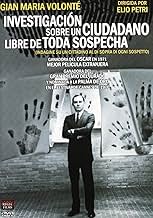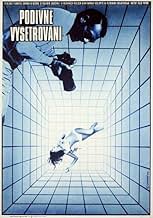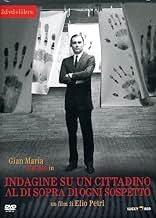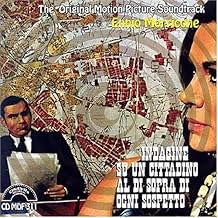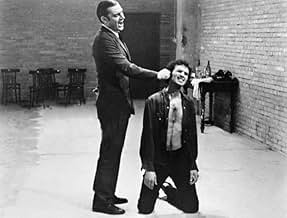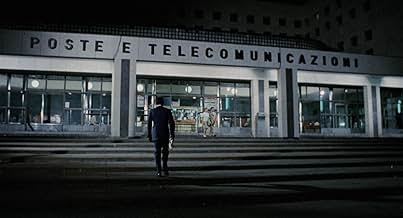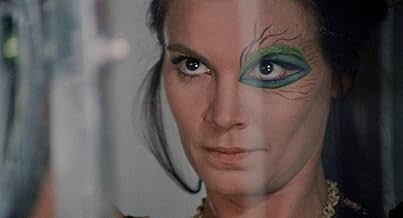Ermittlungen gegen einen über jeden Verdacht erhabenen Bürger
Füge eine Handlung in deiner Sprache hinzuA high-ranking police inspector kills his mistress and deliberately plants clues indicating his responsibility for the crime in a sardonic test to prove that he is above suspicion.A high-ranking police inspector kills his mistress and deliberately plants clues indicating his responsibility for the crime in a sardonic test to prove that he is above suspicion.A high-ranking police inspector kills his mistress and deliberately plants clues indicating his responsibility for the crime in a sardonic test to prove that he is above suspicion.
- 1 Oscar gewonnen
- 16 Gewinne & 6 Nominierungen insgesamt
Empfohlene Bewertungen
This complex film is a cinematic gem thanks to its multifarious tropes at times absurd black comedy, at times vitriolic political satire, at times psychological study into sexual fetishism and power. Of course, all of these themes intermingle so effortlessly that you can't help but be taken aback by the richness of Petri's byzantine vision. The left-leaning director here depicts the autocratic terror that overtook Italy in the late 60s, an overture to the tense, decade-long period known as the "years of lead" in Italian politics a time of fascist repression and a struggle between the equally-as-extreme left and right of center parties.
Beyond its political overtones (which are universal yet now paradoxically outdated, as we see rebellious students waving their little red Maoist books around to anger the "fascist pigs" in the police force), Investigation plays its strongest and most universal hand in its view of authority, and specifically, those that wield an ungodly amount of it. The Inspector, in a snug, black suit, commands and degrades his subordinates, yet in the way a responsible teacher would reprimand a naughty student. That is, he believes his own righteousness and position, and here, once he commits the murder of Augusta Terzi (the stunning Florinda Bolkan), he leaves the Law to spin its wheels of Justice, having full confidence in the organ of power that commands him. As the Inspector sits in the office of his boss, the Commissioner (a sleazy Gianni Santuccio), he trembles like a child, waiting for approval and acceptance. After the latter admits to having an affair with the murdered victim, the unperturbed Commissioner asks him amidst a smoke-filled smirk, holding a cigar in his fat fingers, "So, was she, you know? Any good?" Here we can make the link between power and sexual impotence, as the simple reason the Inspector kills his lover is because she has brought to light his personal inadequacies as a man. An individual who holds such dominance over others, who commands such authority, is an addictive aphrodisiac for Bolkan's underwear-hating heroine, but after a while, she sees her Inspector is nothing more than a capricious child obsessed and deceived with a position of power that holds no integrity and no truth. For her, his sexual appeal has vanished, the organ of dominance has grown limp, as the incongruity between the Inspector's projected image and his actual self begins to grow. She hates his little black socks, his dull black suit, and his overall bureaucratic appearance. In a few great satirical moments, we see the impressionable Inspector strolling the streets in a trendy new khaki suit, a purple silk ascot, fashionable sunglasses a caricature of Italian culture to the fullest.
So what prompts Volontè's Inspector to make his final decision? Is he a stern follower of the Law who wants to test it and prove himself superior to his inept colleagues; a sadistic neofascist bureaucrat who lives for control and subjugation of others; an infantile with a bruised ego thanks to an untamable feminine force? Are we, as viewers, not to question his actions, but simply to accept them as necessary because he's "a man of the Law", superior to us, despite his faults, as Kafka leads us to believe or is that just Petri's tongue-in-cheek humor getting the best of us? That's the fun of this great film, and the kookiness of Ennio Morricone's twangy score adds to the comical effect of a dark and witty étude into power, sex, and politics.
One man, called Il Dottore, is holding the sword. He was the former Head of Homicide Squad and leads now the Political Bureau of the Italian Security Court. His speech in the beginning of the film, clearly announces him as a man with palpable fascist tendencies, although the overuse of the word 'fascist' kind of weakens its meaning. This man, incarnated by Gian Maria Volonte, exults the value of a powerful state above any consideration of individual rights. The state must be powerful, authoritarian and any ideas that threaten Law and Order, should be mercilessly fought. It's too simplistic to call this 'fascism', some would say fascism was born in Italy, which would explain that the ideas of a man like Il Dottore could be impregnated by a certain fascist vision but they'd be forgetting that Italy is also the country of Machiavelli, and the whole plot of this psychological political thriller could be considered as a deep, Machiavellian character study.
Il Dottore is fascist in his beliefs and Machiavelian in his acts, two contradictions that totally cancel each other out and makes him more of a very interesting pathological case of egomania. The man wants to prove that the very system that maintains Law and Order, Police and Justice, is flawed because it ensures the existence of citizens beyond suspicion. This man wants to denounce the main obstacle, the thing that makes his job ethically useless. The mission sounds noble... except that the way he chose to prove his point is the act of a maniac. A crime to denounce, to make the point he himself incarnates, that there are some citizens above suspicion. So high above this suspicion that they can leave clues to denounce themselves without never being worried. Because people believe in men who incarnate order. Power's aura seems more efficient than its use. Power relies on its own abuse.
And that's the theme of the film. What is power? Il Dottore incarnates it with such charisma and virile magnetism that whatever comes off his mouth sounds like the truth. If he says he's guilty, it can't be anything but irony or sarcasm. The simple thought that he could be guilty of the crime he committed sounds like a blasphemy. Indeed, the power is a deified notion. And like the power of God is perceived in our everyday life, the same goes for Law. Order is real, and can't be based on abstraction. The paradox is that an abstraction is not palpable enough to be respected. Fear of punishment controls people more than interests, as said Machiavelli. Therefore, it is no surprise that socialism is considered as an escapism from individual interests and therefore can understand only one language : repression. Il Dottore handles the questioning of the left-wing activists just as if he had personal reasons to fight them, because they're the most likely people to legitimate the use of repressive violence.
Indeed, it is personal. Jealousy, weakness, humiliation, power is represented by men, who are flawed. This is a brilliant character study of a man using power as an artifice to disguise his weaknesses. He's the Law but he's a citizen, he's power and he's powerless. His interactions with his victim totally deconstruct the character, and extinguish the aura and prestige he incarnates for his men. With this woman, his authority is like the toy the little boy proudly shows. Power allows him to run a red light or share some gross crime-related experiences, so voyeur it sounds childish. They're big children but they have the power. So, whom the power belongs to ? Women? Anarchists? Who's the leader? the system ? No, what leads the world is only human judgment ... The truth is in its appearance and this is what guides human perception.
Il Dottore denounces these fallacious perceptions in such an original way, we also can't believe this man has this status and is so respected, which makes us question the legitimacy of some our leaders ... after all, men are men, and behind every great man, there's a woman, and who really knows how these so-called great men behave with these women? Gian Maria Volonte gives us a hint through an extraordinary performance. In the cinematic world of character studies, Il Dottore is a living paradox highlighting our own weaknesses as men who believe in a system of powers, or our owns for the luckiest ones. His charisma makes him all the more pathetic in some key scenes and his pathos more admirable in some others. Elio Petri's investigation is a fascinating political thriller whose introspectively paranoid feeling is sublimated by Ennio Morricone's score.
"Investigation of a Citizen Above Suspicion" is an intelligent masterpiece denouncing the paradoxical nature of Law where the holders of the sword tend to fight those who hide themselves behind the shield while the shield protects only those who use the sword. Gian Maria Volonte is the soul of this contradiction.
During the years following seeing the film, I would recommend the film to all my friends. What struck me when I had the chance to view it again was how well I had remembered the movie, every scene. Few, if any, movies ever made such a lasting impression from my first viewing and it still has that effect.
Besides the great script and direction, what made it complete was one of the finest performances by an actor I've ever seen. It is up there with the greatest work of such as Olivier, O'Toole, Depardieu and Mastroianni, to name a few whose work was staggering.
As to its unavailability, maybe someone should rattle IFC's cage asking them to air it again or maybe get TCM to air it.
I absolutely loved this film. It is part crime thriller, part detective story, and a bit of political corruption. Being Italian and having an Italian sensibility, it reminded me more than a little bit of the giallo film genre. But yet, it was distinct. The giallo is in some ways the precursor to the slasher, and this was not that sort of film -- not gory and the killer is not a masked and gloved man.
What really stands out is the score from Ennio Morricone. He has made many scores over the years and without exception they have been quite good. Is he the best composer of the 20th century? Maybe. And I would daresay this is among his very best, easily in the top three. The score alone makes the film worth watching.
Wusstest du schon
- WissenswertesFirst part of the "Trilogy of Neurosis", also including Der Weg der Arbeiterklasse ins Paradies (1971) and La proprietà non è più un furto (1973).
- Zitate
Il Dottore - Former head of homicide squad: The people are underage, the city is sick. Others are tasked with educating and curing this. Our duty is to repress it! The repression is our vaccine! Repression and civilization!
- Alternative VersionenThe subtitled American version distributed by Columbia has slight differences in the credits. The Italian version opens with blank white-on-black credits (as many other Petri films do). The American version projects the credits onto the opening scene with the Dottore walking around the street. Both the opening and the closing credits (including the film's title and the Kafka quotation) are translated to English as well.
- VerbindungenEdited into Colpiti al cuore (2019)
Top-Auswahl
- How long is Investigation of a Citizen Above Suspicion?Powered by Alexa
Details
- Erscheinungsdatum
- Herkunftsland
- Sprache
- Auch bekannt als
- Investigation of a Citizen Above Suspicion
- Drehorte
- Produktionsfirma
- Weitere beteiligte Unternehmen bei IMDbPro anzeigen
Box Office
- Bruttoertrag in den USA und Kanada
- 265.470 $
- Laufzeit
- 1 Std. 55 Min.(115 min)
- Sound-Mix
- Seitenverhältnis
- 1.85 : 1



